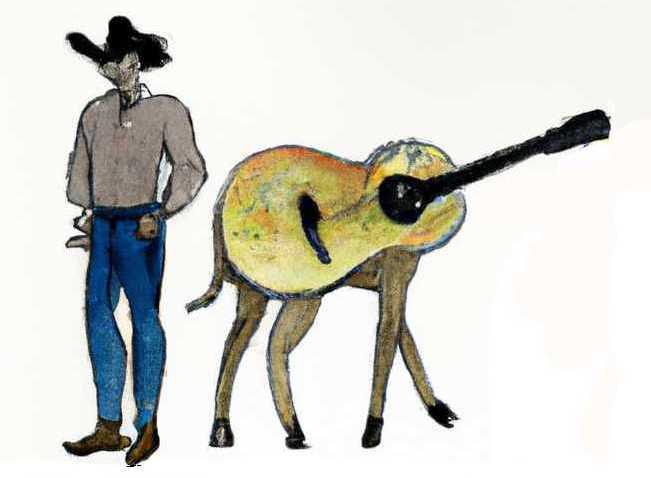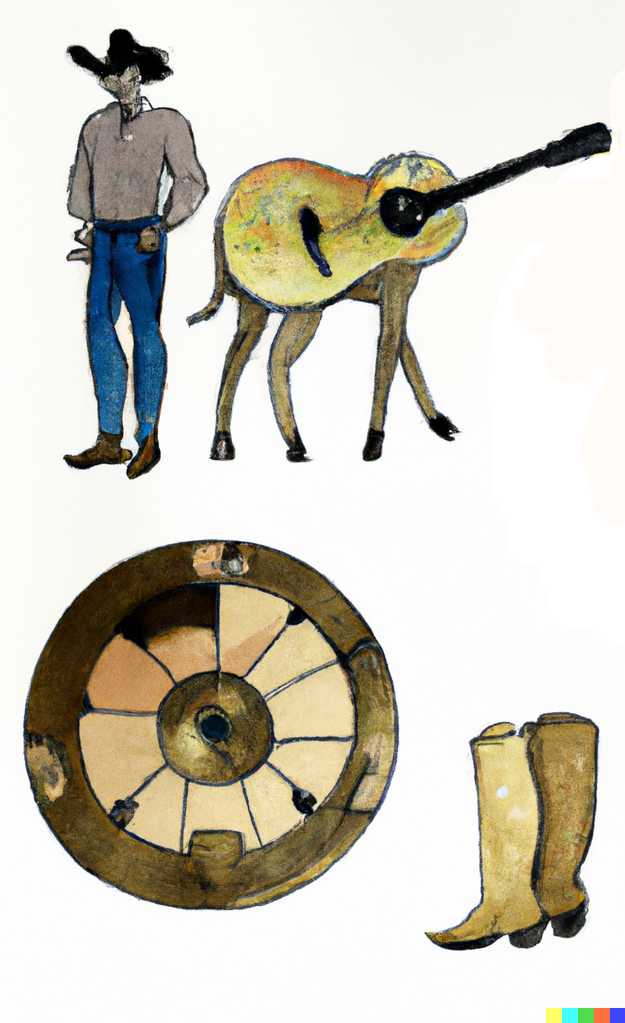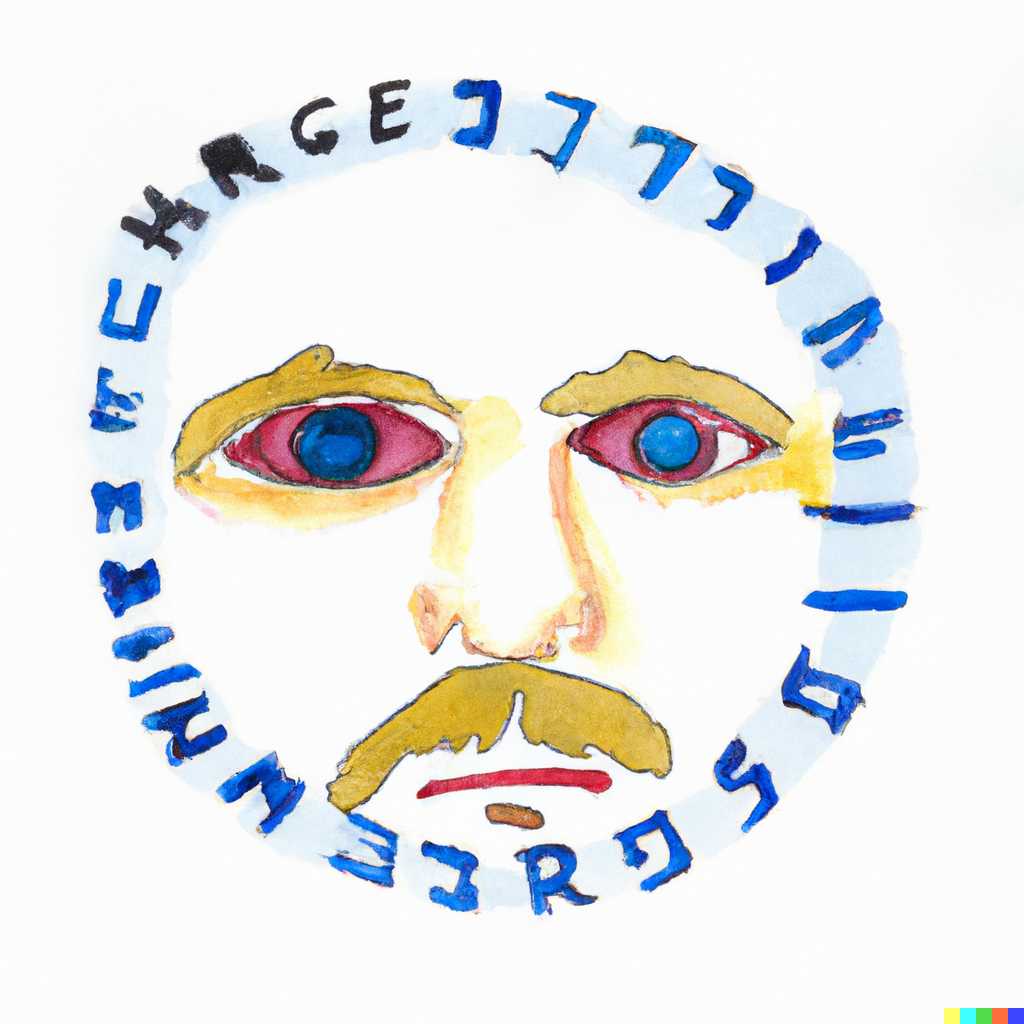Cracking country |

|

DALL-E: "country music encrypted, watercolours"
Context: my hobby is getting into things, new parts of culture.
One of my students won a prize off me: I am to help him get into a subculture or idiom of his choice.
Lucky for me, he picked country music instead of something really difficult like the Dirtbag Pro-Putin Left or homotopy theory or Lacan or opioids.
About 10 years ago there was a meme amongst music nerds: you’d say proudly that you “listen to everything, except country and rap”.
Rap has escaped this status; it now sounds weird if not reactionary to say you don’t listen to any, or anyway weird to be proud of this gap in your taste. Country escaped less.1
But as part of my unending quest to be more contrarian than the contrarians, I got into it a few years ago. Here’s how:
Some key questions for probing your own distaste:
“Why don’t I like it? Do I not like the people who like it?”
We hate country because we hate its audience. We hate country because of what we think its average political views are. We hate country because we hate country-pop, which is all we hear passively.
“Do my friends dislike it?”
Yes, probably. This is despite it being one of the most popular genres in the world. And the sheer strength of social assortation should worry you: you probably don’t know your own country or your own town that well.
“Does it offend me? Is it ugly? Low class? Pretentious?”
If you’re reading this, you’re probably put off by its conservative strain, even if this isn’t full-blown moral panic.
You might currently find the aesthetic - nasal voices, cliched harmonies, simplistic narrative - difficult and tasteless. I’ve also noticed quite a lot of American snobbery about thick Southern accents.
“What is it trying to do?”
Let’s get it out of the way: some of it is trying to exploit partisanship and own the libs.
But more than half of country is instead about personal hardship, mostly emotional hardship. One lens is then country as “farm emo”. Hillbilly elegy. Emo was also hated because of its audience; emo was also notable for men loudly expressing emotions. (Exaggerated emotions? Sure, but so what?)
“How would I have to change to get it?”
You’d have to stop viewing disliking it as virtuous. You’d have to realise that it’s too big to write off from the outside: that it has a left-wing tradition, an unsentimental tradition, and its own elitist system of distinction.
Charlie Parker… was between sets at one of the clubs he played at on Fifty-Second Street in New York City in the late 1940s. Much to his fellow musicians’ shock, they found him feeding nickels into the jukebox, playing country music songs. “Bird,” they asked, using his famous nickname, “how can you play that music?” Parker replied, “Listen to the stories.”
1. Canon.
Just my canon; I make no claims about the bona fide canons, which I haven’t really explored yet.
- Johnny Cash is the usual gateway, particularly the final raddled Rubin albums.
- The rural soundtracks of the Coen Brothers
- Merle Travis
- Merle Haggard
- Hank Williams 1 2 and 3
- John Prine
- Kris Kristofferson, Willie Nelson, etc
- Anyone Jack White has made an album with
- Ralph Mooney
- Iris DeMent is one of the greatest singers in any medium. The speedrun of cracking country is just listening to her until you get it.
(Unusually, I didn’t find any great critics of country, which is usually how I get into things.)
Several possible lines of attack:
- “Outlaw” country (often anti-Vietnam war)
- Alt country (opposite political baggage)
- Or go back up the tree from which country came. The common root of blues, folk, country gets called “roots”. Early country is a lot like white blues plus Celtic folk, for instance. Bluegrass is a related virtuoso form, often with no lyrics, and is easy to appreciate for anyone who likes technique. Here’s the roots playlist that got me into it:

"Merle Haggard cryptography, watercolours"
2. Technicalities
Jargon
- “Nashville” (as itself an elitist, progressive, profit-driven machine!)
- “Outlaw country”
conventions
- Nasal singing; piercing levels of treble. But obviously also some baritones and beyond.
- Steel guitar
- An aggressive defence of dignity and “ordinary folks”.
techniques
- Whistling and harmonica solos
- Bottleneck slide
- pedal steel
3. Material conditions
It originated among desperately poor white people in the South: hillbillies. (One upmarket term for it is thus “Appalachian folk”.) But what we know as country music only got going in the 1920s – just as America became a majority-urban people for the first time. So you can see country as just that: the voice of the self-consciously diminishing rural. Defensive.
Not coincidentally, country is massive in large parts of Africa.
It’s a huge business. Garth Brooks was the second-bestselling solo artist of the 20th century in America.
See also my above skit on country as one of few places for male emoting in some parts of the world.
See also
- https://www.goodreads.com/book/show/388758.Will_the_Circle_be_Unbroken
- https://www.publishersweekly.com/978-0-06-019047-7
- https://www.goodreads.com/book/show/16033285-hidden-in-the-mix
- https://www.goodreads.com/book/show/18723634-rednecks-queers-and-country-music
Comments
Max commented on 10 August 2022 :
Thought you probably enjoy Bo Burnham’s take on stadium country, if you hadn’t seen it yet: https://www.youtube.com/watch?v=y7im5LT09a0
JSD commented on 11 August 2022 :
A decent line of attacks is Soundtracks.
Eg I like Flowers on the Wall because of Pulp Fiction, and Tumbling Tumbleweeds because of The Big Lebowski.
Tags: art, status, subculture